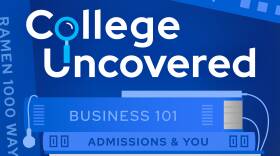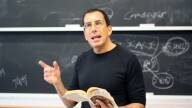Harvard makes contingency plan after Pentagon cuts military programs
The university says military applicants can either defer or be considered for admissions at peer institutions.
Podcast: College Uncovered
-
S4 Eps 5 The Student Trade Wars
U.S. colleges have long relied on international students – and the big tuition checks they bring – to hit enrollment goals and keep the lights on. But now, just as the number of American college-aged students starts to fall – a trend known as the “demographic cliff”– global tensions are making international students think twice about coming to the U.S. for college.In this episode, hosts Kirk Carapezza and Jon Marcus take you inside the world of international admissions. With student visa revocations on the rise – often without explanation – and a growing number of detentions tied to student activism, some international families say they are rethinking their U.S. college plans. And that has college leaders sounding the alarm.As the Trump administration ramps up immigration crackdowns on campuses across the country, many worry the U.S. could lose its status as the top destination for global talent. So what happens if international enrollment drops just as domestic numbers dry up?The stakes are high – not just for students and colleges but for the entire U.S. economy. -
S4 Eps 4 The Revenge of the Humanities
American higher education is approaching a sharp drop in college-aged students — a trend known as the demographic cliff. At the same time, following decades of declining enrollment, humanities programs are being forced to adapt or risk disappearing altogether.In this episode of College Uncovered, hosts Kirk Carapezza and Jon Marcus explore how some colleges are rebranding liberal arts as “applied humanities” or “leadership studies” to better connect with career paths and market demand. With humanities majors down significantly over the past two decades, schools are searching for new ways to make these degrees more relevant — and more appealing.We travel to Georgia Institute of Technology in Atlanta, where enrollment in the College of Liberal Arts has jumped 80 percent over the past five years, thanks to a fresh focus on technology, leadership and career readiness. We hear from Richard Utz, interim dean at Georgia Tech, and Joy Connolly, president of the American Council of Learned Societies, who argue that humanities graduates bring some of the most in-demand skills to the workforce: communication, critical thinking, collaboration and the ability to navigate ambiguity.Listen to learn how the liberal arts are evolving — and why their survival may be essential to the future of higher education and the workforce. -
S4 Eps 3 The Missing Men
Something has been happening on college campuses that’s as surprising as it is dramatic: The number of women enrolled has overtaken the number of men.Women now outnumber men by about 60 percent to 40 percent, and that gap keeps getting wider. And men who do enroll are also more likely to drop out.There are a lot of reasons for this. Boys get lower grades than girls, on average, in elementary and middle schools. They’re more likely to be held back or face disciplinary actions. They’re less likely to graduate from high school. And more men than women go into the skilled trades, instead of getting college degrees.Among the results: Universities and colleges now tip the scales for men in admission to try to keep the genders even.But as things keep falling out of balance, there are impacts on the financial success for men and on economic growth for everybody.We’ll hear from men and women students about what that’s like right now, and from colleges about what they’re trying to do about it. -
S4 Eps 2 “Tag, You’re In!” – The Rise of Direct Admissions
The anxiety-inducing college admissions game is changing – what if colleges started applying to you instead of the other way around? With declining birth rates and growing skepticism about the value of a degree, higher education is facing an enrollment cliff, set to hit hard in 2026. That’s 18 years after the Great Recession when many American families stopped having babies. As competition for students intensifies, more states desperate for workforce talent and schools dependent on tuition dollars are turning to direct admissions – a system where students receive college acceptance offers and scholarships before they even apply.In this episode, hosts Kirk Carapezza and Jon Marcus break down how we got to this point where the college admission process requires students to spend a ton of time and money with no guarantee of success. And they ask whether direct admissions is the solution colleges and students need – or just a Band-Aid on a bigger enrollment crisis. -
S4 Eps 1 The Demographic Cliff
Most Americans would probably rather forget the Great Recession that began in 2007. But as long ago as it may seem, it triggered something that is about to become a big problem: Americans started having fewer babies, and the birth rate hasn’t recovered since. That means a looming decline in the number of 18-year-olds. Since those are the traditional customers for universities and colleges, enrollment is projected to fall dramatically and campuses to close. In this episode, we tell you the surprising benefits of this for students and their parents — and the scary prospects for the economy, which will suffer shortages of workers just as baby boomers retire. Come with us to a college fair where recruiters line up to compete for applicants, and hear from enrollment consultants, economists, and the president of a school that has already closed.













